#arknights essay
Text
Gnosis Musings About The Manga
Original thread on twitter.
I think one of the things the manga makes clear is that Gnosis is Just Like That, and he's always been Like That even before BI. While focus is given to how Enciodes has not always been the smug chessmaster we know and love today but rather became that way through experience...




...we see that Gnosis by contrast has always been shameless, fearless, and committed. No shame faking drunk; no fear of radical actions; ready to do whatever it takes. It instantly hearkens back to his public "humiliation" in BI.



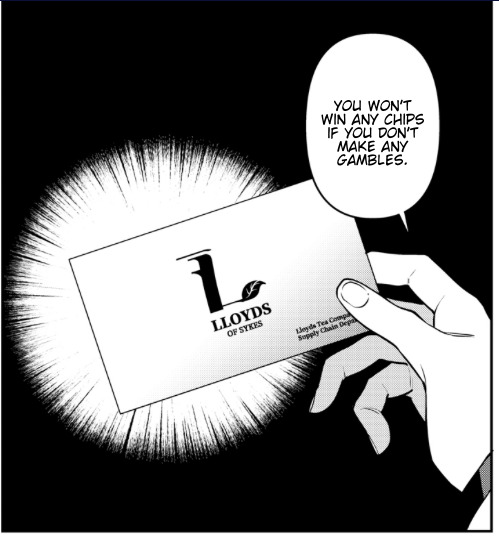
It also lends a whole new life to this line; I always thought it referred to the fact that he was blamed for the deaths of the Silverashes, but now I wonder if he meant it in a more literal sense, too.


We also get another view of Gnosis in general, and how he behaves around two of the people he arguably trusts most (though for half of it he doesn't fully trust Degen yet), and I find it absolutely fascinating, and how it demonstrates how tsundere he can be.
Ironically, despite his file emphasizing how he doesn’t have energy to spare for emotion, Gnosis is someone who’s very blunt and open with negative emotion: he displays displeasure and anger without hesitation, including towards Enciodes and Degenbrecher.
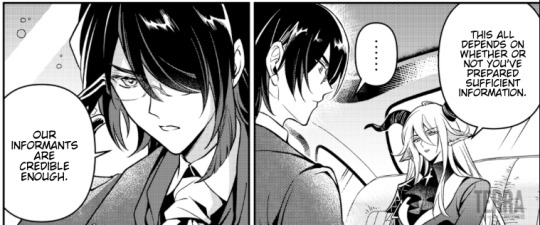
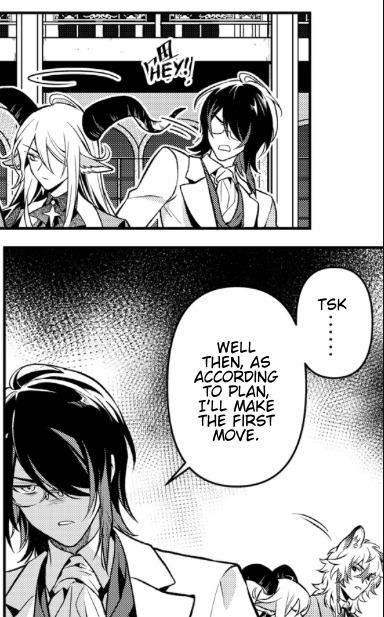


But Enciodes and Degenbrecher both are comfortable with this aspect of Gnosis: Enciodes doesn't bat an eye when he starts laying into him for some reason or another, probably because he's already used to it. (Look at child Gnosis in that flashback; he's always been Like That.)



While I'm sure we'll see more of this during RS, I feel like an argument can be made that Degenbrecher gets used to his squawking very quickly. She seems almost amused by him throughout the manga (consider as well that she's likely been living with them for 3 months).
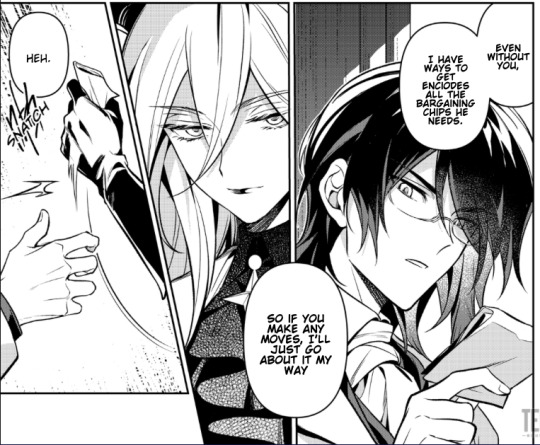
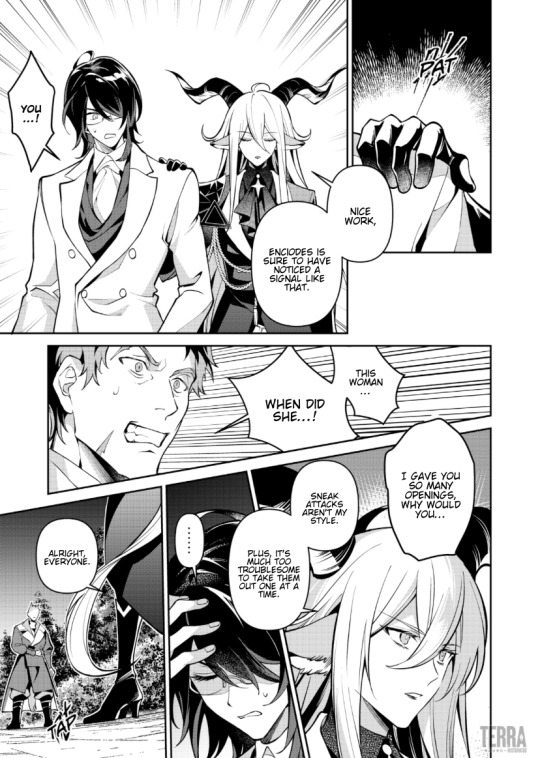


Yet despite Gnosis being verbally dismissive or combative, there's a large emphasis placed on the fact that he'll do anything for Enciodes and Karlan Trade, but he'll never say so.


Even to himself in his module story, Gnosis insists that his loyalty is only to his own choices, but his choice is once again Karlan Trade, which is the company he co-founded with Enciodes and is the vehicle for their shared dream.
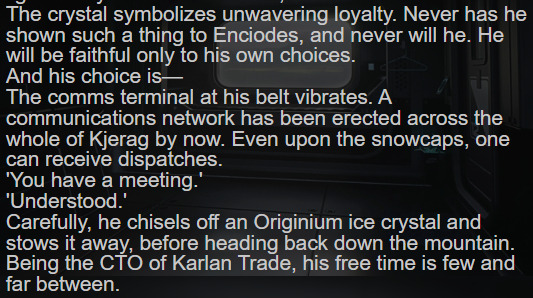
We also see Gnosis has always cared more about executing things perfectly than deep communication; he values things being understood and grasped wordlessly rather than explaining all, a rapport he shares with his partner. (Note that they likely had to improvise during their plan.)

It may be partly personal interpretation, but I feel like Gnosis bickers with people he cares about, almost in some way of showing affection. He may claim he doesn’t care, but his actions tell a different story. (And I love that Enciodes often bickers right back at him.)
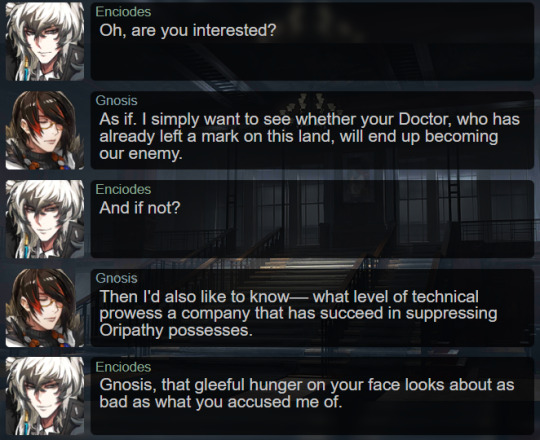
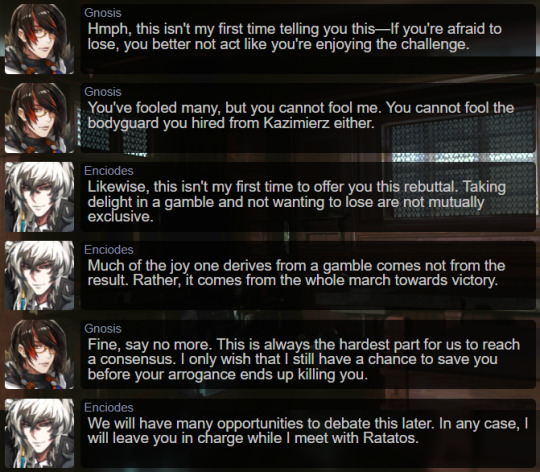

I would also be remiss if I didn't mention his EP, which is absolutely bursting with emotion, love, and dedication. "Please don't leave" "The reason I fall, take my heart and save me from the end" "'Cause when we fall through dreams [...] we'll move beyond together"
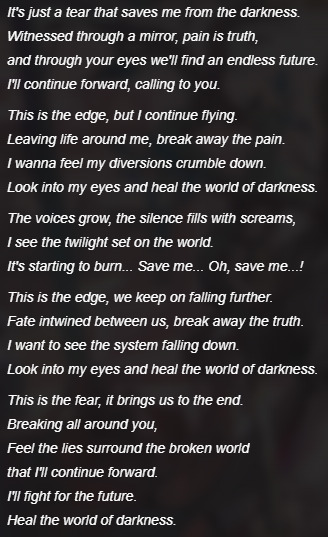

Conclusion: Gnosis is a tsundere arson crane who probably has a literal crime record because he just doesn't care about what it takes because he's 110% committed (and doesn't think twice about plucking out his own feathers for brocade). I look forward to more of his antics in RS.
12 notes
·
View notes
Text
I’ve written a few fics about Czerny now, and at least one specifically around the idea of him being autistic. I received a lovely comment where a reader was interested in the idea and was curious about textual evidence, and seeing as others have written in-depth posts about autism headcanons...well, I decided to do the same, and to post it here instead of in a long rambly comment-response!
So without further ado...some headcanons on Czerny, how he could be read as autistic, and how this influences his character, under the readmore. Light spoilers for Lingering Echoes, Ebenholz’s operator record, and Czerny’s trust files are included for those who haven’t read. (And for those who don’t want to read: enjoy this art from his creator!)

I didn’t set out to headcanon Czerny as autistic when I first read him, I swear. However, as I read through his dialogue and operator files, as well as overanalyzing some of his design choices, I realized that an argument could at least be made for him having a Sensory Processing Disorder (something that runs in my own German/Swiss-Austrian family). Thus, let's start with some of those points:
Stimming. He outright states this one in a trust dialogue: "My hair, well...I often unconsciously grab at it while composing, if that explains its current unruliness".
Speaking of hair: in both his official art and all the art by his creator, he always has his hair braided directly above his ears. The outfit, collar, and even his eyewear changes, but that element of his hair remains. Wouldn't it make sense if he's overly sensitive to his ears being touched by stray hairs, so he takes extra pain to maintain those braids?
Issues with food. There are repeated comments about Czerny not eating when he's in the throes of composing, which at first glance I took for hyperfocusing on his work. He's also the most wary of Hibiscus's cooking in Lingering Echoes, which is clearly meant to be played for laughs regarding her cooking. However, I also read it as someone who's used to having his food a very particular way, and when the food is changed up or replaced entirely, adapting to new textures and flavors can be difficult.
It makes sense that Czerny would take special care of his hands, and this comes up in a lot of dialogue. The medics even comment that he'll panic if he has "so much as a hangnail". But if he's sensitive to touch and texture, AND he takes extra care over his hands, an overblown reaction like that would make sense.
Now, as I was reading into his files and dialogue for these points (as well as other fic research), I was struck by a few other elements.
One is his blunt, honest manner. Both in-universe and as noted by fans, Czerny can be a harsh but fair critic. He himself states that "Any charm or taste I may have had has been poured entirely into my compositions." For the most part, he doesn't concern himself with pleasantries or making nice; if he has an opinion, he'll state it. But he's not one to lie, and even espouses the importance of earnestness to Ebenholz during Lingering Echoes.
Despite this though, Czerny does have to hide a lot of his own emotions in order to deal with his circumstances, at least in Lingering Echoes. He has to bow to Nobles and their whims despite his loathing for them, and there are numerous points where he holds himself back from voicing his opinions in public. He also identifies himself as a coward, and has multiple dialogue lines denoting his own fear. "I'm terrified, Doctor. Always have been."
Looking at these elements together, I'm under the impression that this man has learned to mask a lot in order to survive. And when under the constant pressure of not only poverty and illness but also supporting an entire community? No wonder he’s considered tempermental.
The only times he seems able to truly express himself is through his music (note how he emphasizes the importance of emotion in music during his 2-star clear line) and in battle, where he goes from polite to screaming at his enemies. We also have the note in an operator file from a professor that Morgen und Abend was one of the few glimpses through his "iron body". And there are multiple times in both files and dialogues where it’s noted that he’ll refuse to budge from his desk until a composition is complete...that moment, perhaps, when he finally figures out the feelings in his heart and how to express all the things his words fail to convey.
Music is how Czerny expresses himself, though one should also note that empathy for others is also important both in and out of music. After all, he corrects Ebenholz that Morgen und Abend wasn't written from his own grief, but out of indignation for how she suffered. He gives up the rights to his music in order to save the people of the Afterglow during the events of Lingering Echoes. Hell, even in Ebenholz's Operator Record, Czerny is touched that Ebenholz is the one defying orders and performing for the Afterglow's residents, but also begs him to stop in order to keep him safe. He loves music, true, but he loves people even more, and he cares so damn much he’ll repeatedly put his life on the line for them.
So, whether or not it was intended by anyone who worked on his character, Czerny reads to me as autistic. Passionate about what he loves, keyed into the feelings of others while having notable difficulties with conveying his own emotions outside of music, and processing the world a little differently from those around him. And I think that’s all key to not only how he creates his music, but how he connects with others, and how he’s learning to move on in a world so much bigger and stranger than where he grew up.
And even if he's still figuring out how to balance the new and familiar...even if he's scared of it at all times...Czerny keeps going anyway. He helps others with music and arts. He expands upon his own skills, even developing new hobbies in habits. Hell, he even gets a motorcycle to go exploring across “those faraway lands roaring through Czerny's mind without abate.” He's going to be okay.
(And watching Czerny be brave and move forward in the face of so much change...well, it inspires me to bravery too.)
Well, those are my thoughts with evidence on the matter, and I’m sure I'll pick up more when I do a full reread of Lingering Echoes. In the meantime, feel free to share your thoughts, and I hope you enjoyed reading!
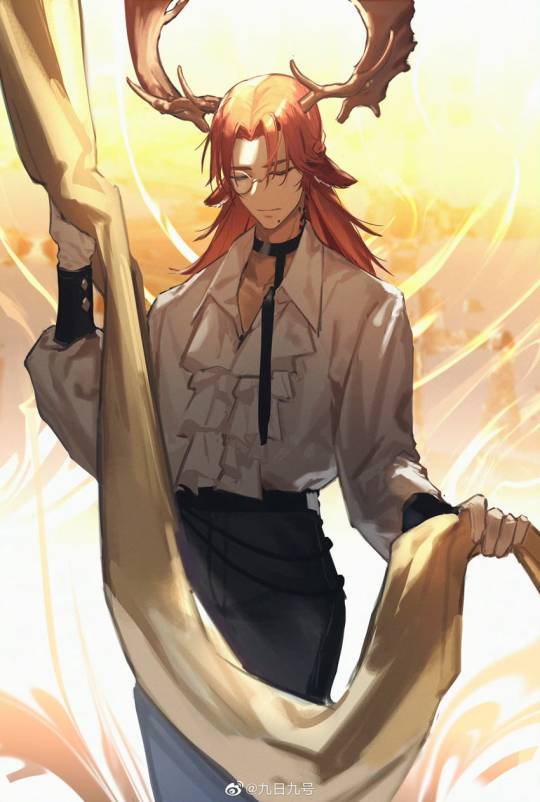
(and have some more creator-art because I am incredibly gay for this image okay byeeee)
#arknights#arknights czerny#bedlam rambles#arknights headcanons#autism headcanon#bedlam essay#arknights essay
39 notes
·
View notes
Text
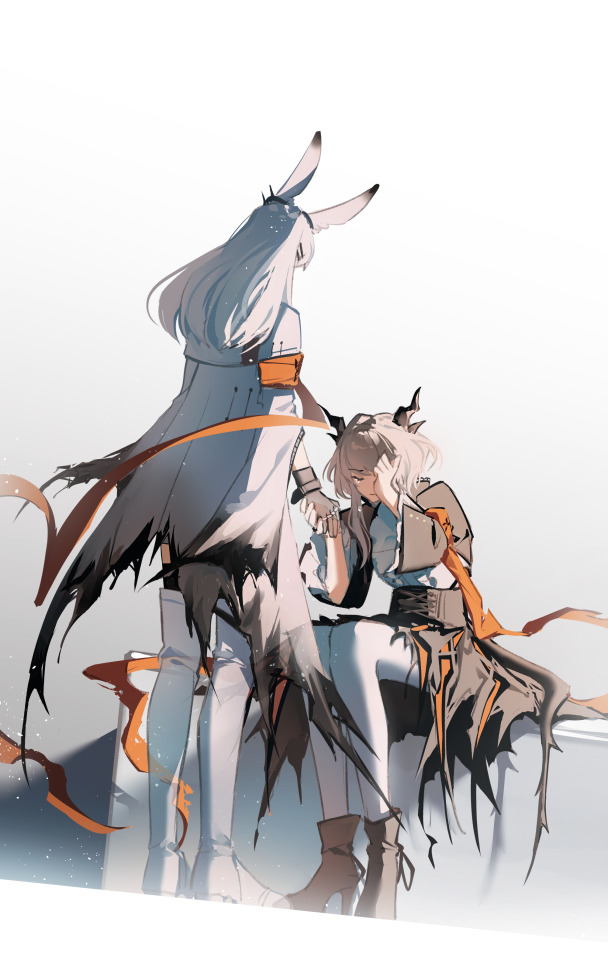
i would've allowed you to grieve
#my art#arknights#frostnova#talulah artorius#LISTEN TO ME#ive recently had so much thoughts about tal and grieving#like what if she doesnt even allow herself to grieve#the same way she wont allow herself to die bc she doesnt deserve it yet#and then i thought....i just know yelena would allow her to#i woudl write a 10k word essay on thsi if i wanted to#ok thats all ty#talfrost
765 notes
·
View notes
Text
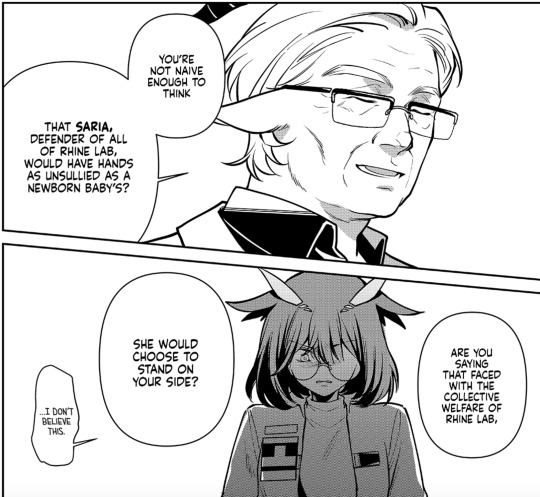
do you ever just remember how one of the most effective things parvis said to get silence to lose faith in saria was essentially "do you really think she would ever choose YOU over everything?" and silence with her low self esteem really didn't believe saria would.
Then in the end saria really did choose them over everything, left her defense director job and her whole life up to that point behind for the sake of silence and ifrit. and silence still doesnt even know. do you ever think about that and lose your mind a little bit.
#turns out my pre lone trail jitters translate to reread the rhine lab manhua and lose my mind over it all over again#its one of those stories i could write multiple essays on#like silence's lack of self love#do you ever notice how in the final scene when she makes her big declaration about curing ifrit joyce and 'the many many infected'#she never mentions curing herself#how she runs into the flames looking for ifrit with no regard for her own safety during the diabolic crisis#even the funny gag moment with joyce is based on silence overworking herself and joyce pushing her to take care of herself#and here where parvis basically says saria would never choose you and silence instantly just accepts that as true#of course saria wouldn't choose her#even her big grudge against saria is anger on behalf of ifrit not for herself#this owl has such a big heart and so much love for everyone but herself#arknights#olivia silence#saria
467 notes
·
View notes
Text
I once heard someone say that because Arknights' disability representation is mostly tied to their fantasy turbo-cancer, then it doesn't feel like real disabled representation, and I've been unable to get it out of my head, like a piece of popcorn stuck in my teeth. So, rather than doing my homework like I'm supposed to be, I want to talk about why I disagree and why I love Arknights' approach to disability.
So, for those who are unaware, Arknights has a shockingly high amount of disabled characters, and characters who are disabled in a lot of different ways, both caused by being Infected and just being disabled in the way that normal people are. Nightingale has chronic pain, Lemuen is the best sniper in Laterano while being in a wheelchair, Akafuyu is mostly blind, Eyja has severe hearing loss, Rosmontis has severe memory loss, Amiya has very severe PTSD, I could go on and on.
And of course there'd be a lot of operators with disabilities! Rhodes Island is a medical organization dedicated towards long-term care of terminally ill patients. Of course many of them would develop disabilities, and of course Rhodes would have the resources and facilities to help them. They even make notes of how to treat them in their medical files, like how Ejyafjalla's has a little guide on how to best have a conversation with her. It makes perfect sense, but I can't say a lot of games would think about it on that level.
And that why I like this game's approach to disability so much. A lot of video games just treat disability as "someone missing an arm" or "someone in a wheelchair because of Their Injuries From Combat. It's usually treated as an individual thing, just someone who got hurt, or who maybe has a frail constitution or whatever. But in Arknights, disability isn't simply treated as a character trait for individuals, but as part of the worldbuilding itself. The world is largely defined by Oripathy, this fatal degenerative disease with no cure. And the Infected are treated as second-class citizens, considered free labor that they don't have to treat ethically because they're dying anyway. The writers realized that this would cause severe disability, both real and fantastical, and worked it into the story and world.
This runs the other way, too! Arknights' worldbuilding follows a sort of social model of disability, in a way. There's a lot of fantasy stories that treat the inability to use magic as a sort of disability, but to Arknights, it's... not. Because Arts require specialized training, and so a lot of people just don't know how to use them, and might not even know they can't use Arts. So it's not treated as such, even though it is still a physical inability to perform things other people can.
But on the other end, Laterano's culture is based around the Sankta having empathic communication between each other. Mostima, as a fallen angel, can't use this telepathy anymore, and she speaks about how othering it feels sometimes, to be physically unable to engage with an important part of her culture. While it's not explicitly stated as a disability to the Lateran culture, I certainly feel like it's treated as one to some degree. Namely that it's explicitly contrasted with Fiametta's PTSD rendering her unwilling to empathize with the people around her, as opposed to Mostima's physical inability. It's the fantasy disability treated with the same weight as real world disability, because within the world of Terra, they're the same thing.
And of course there's just some of the more fucked up fantasy stuff like "On top of her existing narcolepsy, Ptilopsis was forced to become plural after she had to have part of her brain replaced with a computer that forces her to speak and think like a computer or else it causes her severe mental stress to the point of physical pain." Which uh. I don't know where that fits in the conversation but jesus christ someone hug that owl
Of course, its representation isn't always perfect. Just off the top of my head, Nightmare is a pretty rough stereotype, with the whole "Oripathy gave her multiple personality disorder with a violent personality trying to take control of her body!!" trope. And, of course, I'm sure other people have complaints with the representation of their disability in ways that I'm not aware of because I only have the perspective I have.
But... what I remember about this game's treatment of disability isn't when it fails. What I remember is reading Glaucus' module for the first time, the story of the first time she ever put on the mechanical exo-suit legs that allowed her to walk for the first time in her life. And I started bawling my fucking eyes out. I cried because, even though I don't know the specific feeling of walking for the first time in years, I know well what she felt. That feeling of liberation from something you secretly feared was just who you are now. Even though you know it won't be a perfect solution, the physically choking emotion that you're able to get a little closer to a normalcy you've always wanted. The feeling that right now, the only thing you can do is run like the wind.
#arknights#long post#critical analysis#just gonna tag all future essays as critical analysis so that i can find them in the future because i am proud of my writing in these#writing an extremely long essay in order to put off my creative writing homework may be the most on brand thing i've ever done
2K notes
·
View notes
Text
I think the reason I love Horn so much is because she appears to be this paragon of virtue and selflessness and beauty. But on closer inspection she’s almost totally lost it and she’s willing to do some pretty horrendous shit up to and including torture and her entire sense of self has dissolved into making sure her comrades didn’t die in vain to the point I don’t think she quite knows what she’s fighting for anymore. She was supposed to be Victoria’s champion and Victoria chewed her up til there was barely anything left. Woman whose gaze is absolutely fucking haunted.
#like and subscribe for more posts about Rita Skamandros#it’s not even like Oh I Can Fix Her#NAY I do not want her to be fixed#she is so much more fun all fucked up#I’m three seconds away from writing a huge ass essay about her#help#arknights#horn arknights
159 notes
·
View notes
Text
stultifera navis rerun AKA thinking about Iberia hours again because a lot of the Iberians have such fascinating relationships with the concept of home but specifically Thorns and Lumen are eating at my brain. like where do you call home when the place that is your home Just Fucking Hates You? Elysium's rewinding breeze specifically makes a point to hammers home how differently Iberia treats its Liberi and its Aegir
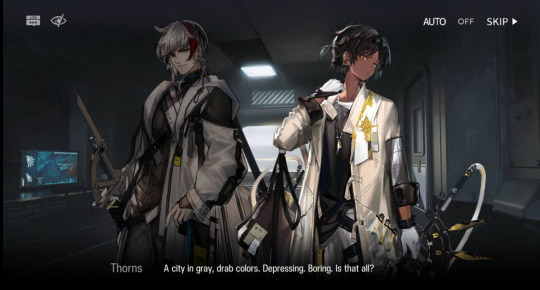
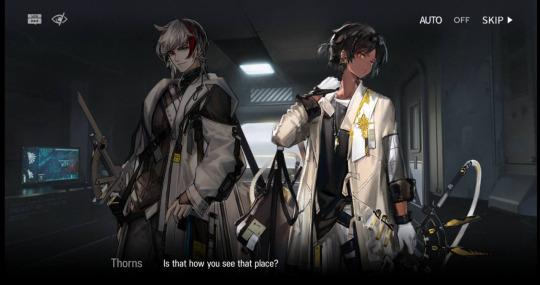
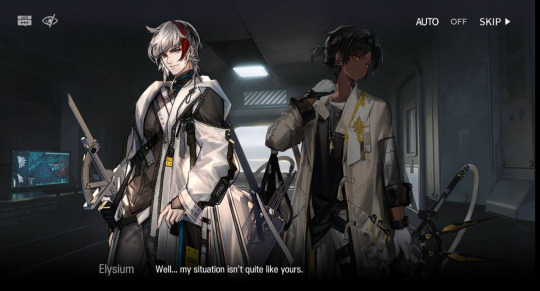
(which is especially interesting since this comes right after a conversation where Purestream commented on how despite Leizi being a high ranking government official, there are still some experiences that are universal for all Yanese people - because the experience of what Iberia itself is like isnt universal for all Iberians)
But all that being said, Thorns also straight up states that Aegir is not his home, and yeah, how could it be? How could a place you've never been to, never truly known, ever be your home? How could it ever feel like a home?
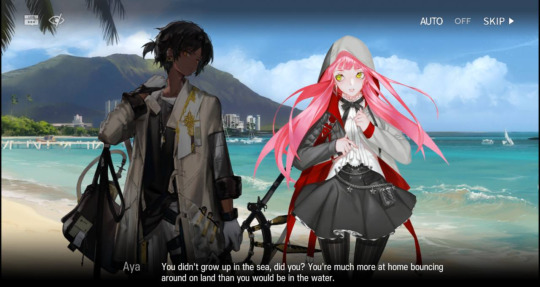
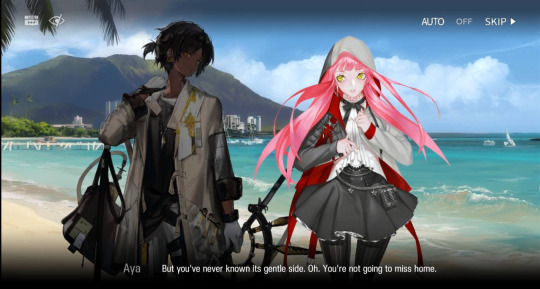
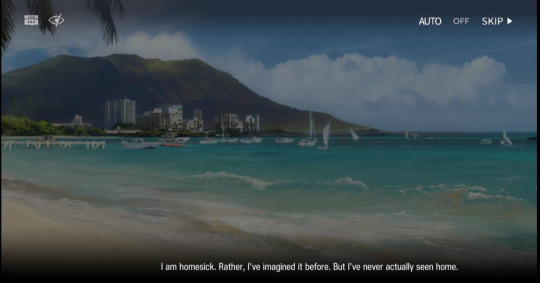
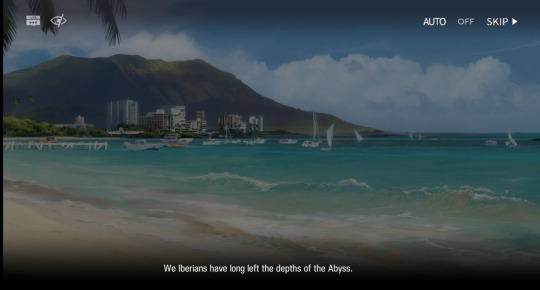
so where do you go when the place that you are from hates your people and the place your people are from is completely unfamiliar and alien to you? Thorns' answer at the end of the conversation with Aya is: my home is where i chose it to be. my home is where there are people I care about and people who care about me
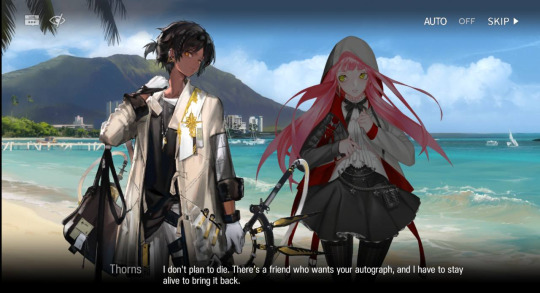
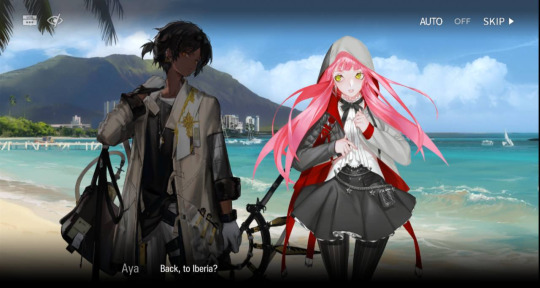
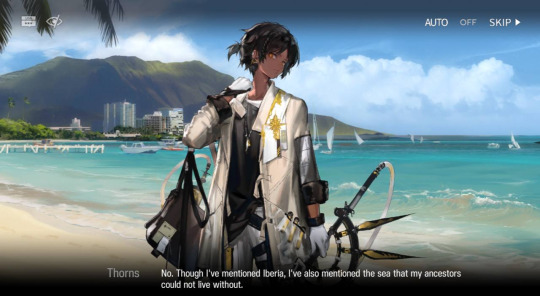
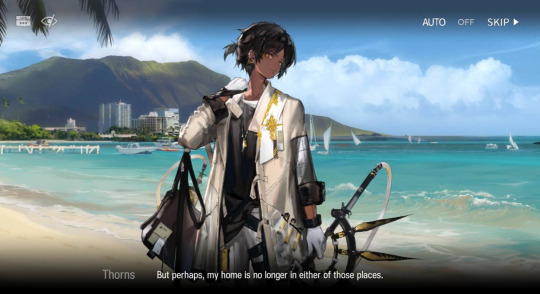
in the complete opposite direction, Lumen's oprec asks: why do you still stay in a place that wants you gone? because the people of Gran Faro like Jordi well enough but when push comes to shove, they will want the only Aegir in town gone
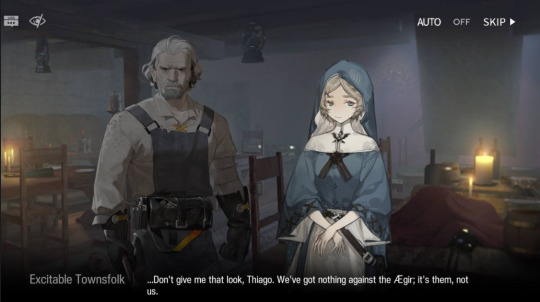

and yet, when Rald the messenger offers him a chance to leave Jordi turns him down and when he's forced to escape Gran Faro after the people there literally try to send him to his death (or worse) at the hands of the Inquisitors he keeps trying to go back because like everyone in stultifera navis, Jordi is clinging to his own dreams of a golden age
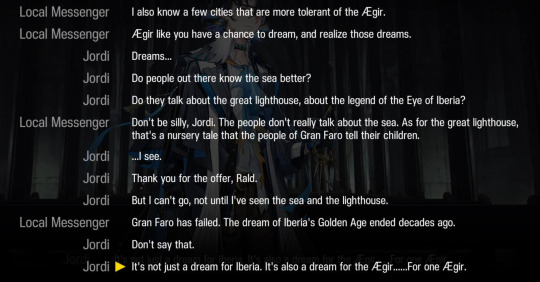
but the shape of that dream is unique to every character and for Jordi, his dreams are deeply, inseparably bound to the Eye of Iberia, the legacy his parents left behind
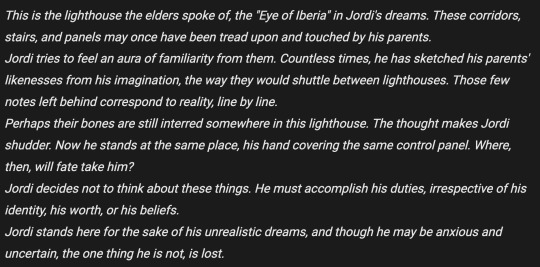

and it's this dream of becoming someone great, of bringing about that golden age that his parents devoted their lives to help create that ties Jordi to this nothing town because despite everything, despite the mistrust of the townsfolk and the hostility of the Inquisition and the danger from the ocean, he simply cannot leave it behind
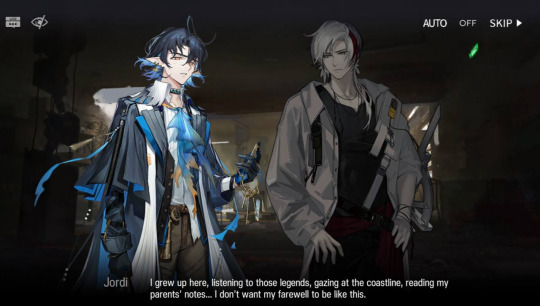
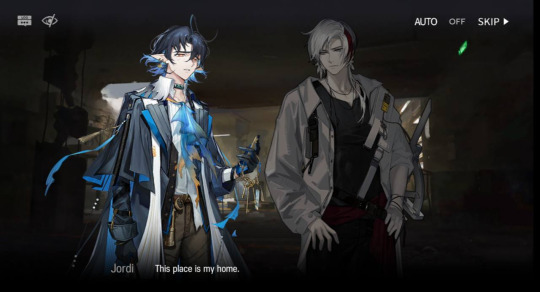
(or, because i personally dislike the official translation,)
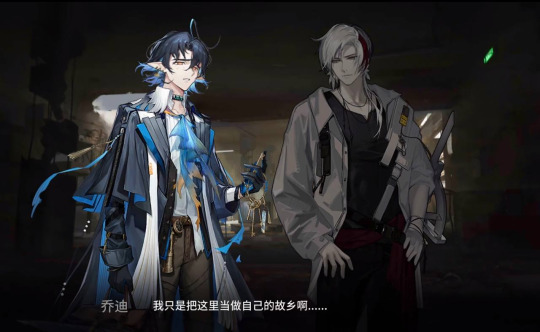
"I just see this place as my home"
so yeah. not sure what overall point i was trying to make here i'm just. deeply in love with these stories about chosing what is and isn't your home, of saying you will not call a place your home because it has given you no reason to or saying you consider a place your home even though it has given you every reason not to. deeply unwell about them <3
#arknights#asto speaks#not much of an essay writer i just keep thinking about them and i need to force other people to think about them too#thorns story fucks me up bc like. this whole almost found family adjacent idea of like#maybe home isnt something decided by your birth but something you can chose based on what truly matters to you#it just gets to me. i guess.#jordi gets to me in a completely different direction there's nothing personal about it i just find his story *fascinating*#just a guy. a completely normal guy. an absolute nobody caught up in these dreams of greatness while also fully aware of his own normalcy#but never letting either of those overshadow the other. never losing that self awareness or that fuckin obsessive determination#god. what a Character#i love jordi so much like genuinely#i joke a lot about him being just a Guy but thats also kinda like the best thing about him#the fact that he is the way that he is and does all the things he does despite being just a Guy#gently holds#for context i was so hyped about new iberia lore when sn was announced i read the whole thing as soon as it dropped on cn server#cuz someone uploaded all the story sections to bilibili right after it came out#and '我只是把这里当作自己的故乡啊' fucking hit me SO HARD#in like the greater context of elysium demanding to know why hes risking his life in like 5 different ways to return to gran faro#because yeah jordi just doesnt want to leave his home but like we the audience knows the full *weight* of what that home means to him#and the weight of the dreams that made him chose to see Gran Faro as his home and to refuse to let go of that#thats why i like the original a lot more than the translation i think like it really emphasises that active *choice*.#this is the place jordi has *decided* to see as his home and he knows what that means and what it means to him#side note the part on thorns might not actually age well depending on whether hg decides to ever release more aulus lore#i mean i'll gladly take the L if it means more aulus and/or thorns lore like#i just wanna know what (if anything) is tying him to iberia yknow#ak#iberiaposting
80 notes
·
View notes
Text
arknights leak discussion
1. Ascalon
mentioning her because we got these leaks minutes before the pv dropped and considering it was her genuine new sprite i’m going to consider the rest of them as factual
2. W
why is she wearing a thong? for ines to grab?
i don’t really like this design. i very much prefer her chapter ten design. her closet is terrible
but also i don’t think this is going to ruin her character? i see people doomposting everywhere about how her redesign is going to ruin her as a character. i don’t think so
3. Theresa
hypergryph has the opportunity to the absolute worst thing ever or make this be really good. right now i don’t like it so im praying they redeem it somehow
it looks like her codename may be Eterna, and i’ve seen speculation that the crown may have taken control of her body? that would be cool, especially considering she seems very out of it almost every time we see her in the main story
(and is she drawn by Chuzenji?)
i don’t want to think about it too much because. again. doomposting everywhere. but we literally don’t know Anything yet so i don’t want to get worked up about it
4. Logos
i’m so happy that he’s getting a proper rhodes uniform as an elite operator. this is a really good design. zero complaints
5. Amiya (Class Conversion?)
the design for this is incredible. she looks like a literal goddess. the little theresa in the background of it, too. it has the same energy as ines and w in hoederer’s e2 art. i love this a lot actually. i wonder what class and archetype she’ll be? medic? in chapter 12, she was helping as a medic so it would fit. her new file would also likely be really cool
#sorry this isn’t really coherent#i don’t feel like formulating actual straightforward thoughts here#i’m very tired from writing essays for like all my classes#arknights#arknights spoilers#arknights cn spoilers#arknights leaks#theresa#ascalon#logos#amiya#w
25 notes
·
View notes
Note
Reasons you love whisperain
Her most characteristics trait people overlook from her
And favourite ships with her innit
-M
Hhmhmm,
When i first saw her it was sorta love at first sight, like, ohhh a gloomy looking cool jellyfish medic with an eyepatch!!! Then when i got to her lore it's so like, her weird form of immortality, her only barely remembered past life(?) connection to the seaborn, her past travels as a wandering medic/in her previous lives. It's really fun to think about what she could've been up to and who she could've met. Also she's so pretty and so cute and i love her reserved but extremely gentle personality.
As for her overlooked traits, i can't really blame people bc it is like, 1 (one) voiceline, but
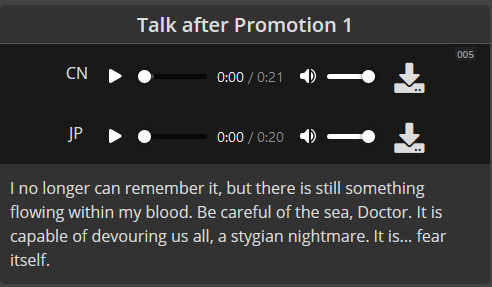
This thing and its implications for her have been driving me insane ever since she dropped in global. What did she see????? Where has she been??? I barely see stuff exploring it from anyone else and it makes me a bit sad
My fave Whispy pairings lately have been her and Andreana's narratively neglected purple girls' club, and aside from that Weedyrain is always a classic (Weedy building an entire movietheater for Whisperain in her oprec for example is so romance)
I tend to um, whimsically pair her up with whomever I'm feeling at the time, for ex. in that church of the deep au/theory of mine i was thinking she'd go well in a tense yuri thing with Amaia :3. Also her voicelines and profile mention Warfarin a lot, so that's also a rarepair i enjoy (even if im the only one to do so waaah). Gameplay synergy wise she goes together so well with Blaze i cant help but also like them together :).
Then there's of course the pretty nice pairing with Dusk (girl who creates art to deal with the horrors vs girl who enjoys art to deal with the horrors, grumpy reserved girl vs kind reserved girl alliance, them both enjoying movies, Whisperain's past allowing her to have met whomever in a past life she doesn't remember and the implications for that with Dusk....)
Basically she never gets anything canon ever at all so in my despair I've taken to playing with her & anyone available like dolls. It's great fun, highly recommend (join me join me join me)
#arknights#iii could probly write a full essay on all my fave whispy rarepairs but mayhaps i wont put that all in one post#i did make my whispy rarepairs collection post a while back but since then theres been new ones so honestly i should make a new one#every day i work so very hard to advocate for whisperain yuri in my neglected blorbo mines#with andreana me & my buddies have been going pretty wild with the lore i should um post about it sometime here as well#liike you know theyve both got only vaguely remembered seaborn connections which theyre sorta running away from.#what if you put them together on a field mission in iberia and everything regarding that went wrong at once & they had to crawl their way#back to rhodes somehow while trying to cling to their humanity/current life :) enriching#asks
16 notes
·
View notes
Note
I wonder if Silence could ever figure out Saria holds actual genuine esteem and care for her, Independent of forgiving her. Like given her self-depracative tendencies the opposite is way more likely, but I'm kinda obsessed with the gas tank detonation of their current dynamic being hit with 'yeah no Saria's been mooning over you these whole 3+ years Silence.'
...I apologise ahead of time if this turns into 'unedited essay' ahead of time because I'm going to stream of consciousness this.
In the Rhine manhua, there's A Lot going on that frankly, you could write multiple analytical essays on, but for this the most relevant is probably the theme of perception, both of the self and others, and how that affects one's relationships. For example, how Ifrit perceives Saria and Silence still as the people who will protect her pushes the narrative of her being the factor that reconciles them, even if only in stages, currently.
With regards to Saria and Silence... in my opinion, Silence understanding and believing in Saria's regard for her? At the very least openness on the truths Saria is still keeping to herself would be needed, and the conditions for that.... Consider how Parvis talks to Silence here:
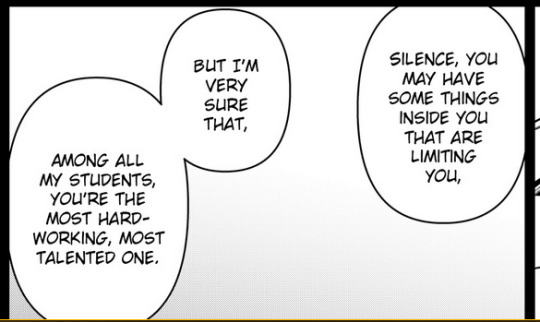
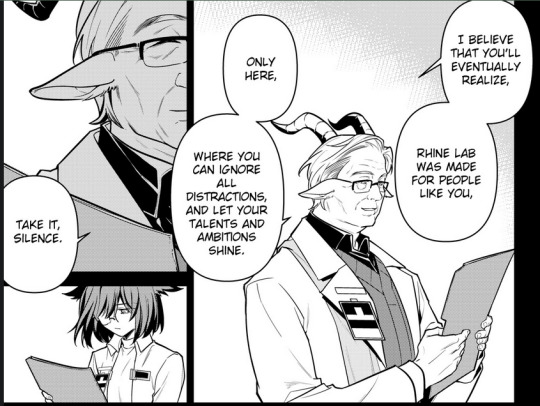
Here we see how Parvis perceives Silence, a researcher still growing, hard-working... and 'blinkered' by things like, oh, caring about the suffering Ifrit and others experience now, for the sake of scientific progress.
This is the doubt that besets Silence now. How far does Saria's care for her and Ifrit (honestly, mainly Ifrit) go? What does Saria see her as? Silence knows, from the referenced chapter, how Parvis and Control see her and Ifrit... and she has very little reason to think Saria thinks that differently. After all, while Saria stated there were powerful people to be wary of, when warning Silence she couldn't speak of what happened, she never made it explicit it was Control. Had Saria at any point expressed anything about the divide between her and Kirsten... I think it's safe to say the relationship outcomes would be very different.
Saria, in trying to keep Silence and Ifrit safe, damns herself in Silence's eyes because how she acts makes Silence fear that Saria condones/approves Control and Parvis' actions. Proper recognition's also hindered by how Saria tends not to be highly expressive with her care—or in other words, how difficult it can be for people to perceive her caring. She carries devotion, deep and true, but it's not loud, for it's in every step of hers... and it's easy to glance over what is always present.
Saria also never divorces herself from Kirsten's actions, and Rhine's as a whole. Because she perceives those failings to be hers, or at least to have her hand on them, because she swore to protect and watch over Rhine, and she still claims it as her own. Consider how she tells the Tin Man she will handle the situation at Rhine, rather than 'ask' the Maylander Foundation to do it. She wants Rhine to be better, to do what she can to guide it back on the correct path, because she refuses to wash her hands of what has been done in its name—because if she did, she would lose the chances she had to restore it.
All that said! I discussed this with @thecatwriter once, but in the manhua's last chapter (non-epilogue stuff), Silence chooses to come to Saria, to express her determination. And to give her half a candy but if I think too long on how that gesture has carried forward I won't be semi-focused anymore so, re-centring: her choosing to come to Saria shows she still cares about Saria's perception. Which may be strange to call a relief, given she said she still couldn't forgive Saria, Control, and Rhine, but as they say, the opposite of love isn't hate, it's indifference.
Saria expressing her belief in her, that she can be the one to help Joyce and Ifrit and the other Infected of Terra, does matter to Silence. So in a sense the belief in Saria is there, but only to a point. It will take time and a few important reveals for Silence to see all that Saria has done to try and keep all she cares about safe/salvageable... but I do think when that happens, I think that yes, Silence would properly appreciate everything Saria's done... even the things that Saria undervalues, or dismisses as just, what had to be done.
#arknights#anonymous#war replies#you probably weren't asking for a mini-essay but you got one lol#Rhine Lab fam
106 notes
·
View notes
Text
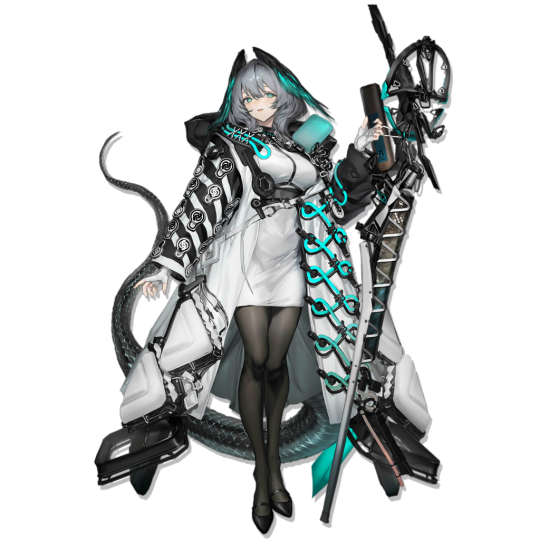
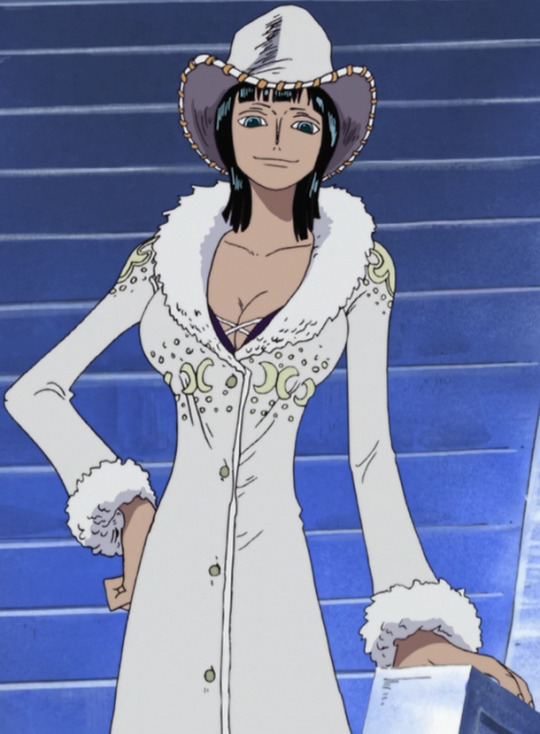
Hear me out...
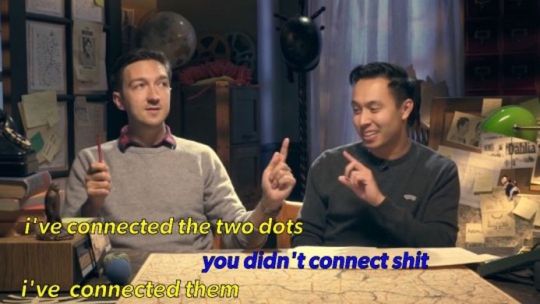
#i'm sure I can make an entire essay about these two but my entire brain processing has been AWOL for the past three months#arknights#one piece#long story short is I really like these two and my brain was thinking they're a tiny bit similar#something something last of their people and carrying the burden of history something#also all the casual murder
4 notes
·
View notes
Text
Lyric Breakdown of "Heal The World" (part 1)
Original post on reddit.
Warning: extremely long text, excessive detail and citations, and some shippiness. Please take with a heaping spoon of salt, this is personal interpretation to the max and not gospel.
Previous essay on Gnosis’s character with some baseline assumptions and interpretations I am making.
I told myself I wasn't going to do this but here we are. On the other hand, though, I deserve it for sleeping on this song for nearly a year after its release. Let's dive in, shall we? Why does Gnosis have such a sappy and emotional image song, and what does it mean?
It's just a tear that saves me from the darkness.
Such a powerful opening line. What does the tear symbolize, what is the emotion behind it? Sorrow, grief, and pain—but pain most of all, as pain is echoed and emphasized throughout the whole song.
Witnessed through a mirror, pain is truth,
Pain and truth go hand in hand, which is a theme which is echoed throughout. It's the pain itself that keeps everything real—the pain (the tear) which saves him from total destruction; the personal anguish which experience keeps him from going off into the deep end.
Now “witnessed through a mirror”: the pain is detached and not a part of him, reflected back at him by something or someone else, and only like that does he see it. Or even, it’s the reflection that confirms it exists at all. Who is the person who is Gnosis’ mirror?
I’ll make no bones about it: the person Gnosis is addressing throughout the song is Enciodes. There’s literally, as I will demonstrate, nobody else he could be speaking to and speaking of.
So: it’s a bit of a stretch, but this could possibly be a veiled reference to their conversation as children where Enciodes says that he doesn’t believe Gnosis is at fault for the accident, but Gnosis does. This little bit of unshakable faith is one of the reasons Gnosis is so loyal to Enciodes, and during that flashback, Enciodes says, “It definitely has nothing to do with you. Nobody looks up to my father as much as you do,” almost as though he’s reflecting Gnosis’ true self back at him, showing him the reality and the truth that he committed no crime.
This is the painful truth that keeps everything real; that Gnosis carries inside of him, that saves him from the darkness: his innocence.
And through your eyes we’ll find an endless future,
During BI-3, Gnosis says to Ratatos: “[Enciodes] promised me a future.” This line is a clear reference to that. Through Enciodes’ eyes and his vision for Kjerag, an endless future, bright and dazzling, awaits.
I'll continue forward, calling to you.
This line also refers to Enciodes.
In fact, it wouldn’t be much of a stretch to argue that this entire verse refers not merely to the present moment, that is, Gnosis’s present position, but also, to the moment of his departure from Kjerag. When they parted ways, Gnosis said he would study and learn what he could to return and help Enciodes achieve their dream. In his operator file, Gnosis also comments about making “an appointment” to see Enciodes again, and returning Kjerag even if he did not appear. Though their paths are separate, they share the same goal, reflected in Gnosis’s second talent, “Two Paths, One Goal.” He continues working for the sake of their dream, while still connected to Enciodes.
This is the edge, but I continue flying.
As Gnosis goes forward, he reaches the edge. It’s a figurative cliff, with nowhere to go and only death at the bottom, but he willingly flies past this precipice on his own wings.
Leaving life around me, break away the pain.
“Leaving life” refers to Gnosis’ decision to cut himself off from the trappings of ordinary life and keep other people at arm’s length. “I am not interested in deeper emotional exchanges.” He was already ostracized before, and he embraces it, regardless of the fact that he's reached the edge—perhaps the limits of endurance or rationality or sense. He also "left life" in a more literal sense when the Edelweisses left everything they knew in Kjerag.
Then we come to the second part. “Break away.” There are three definitions of this phrase:
To separate or detach oneself, as from a group.
To move rapidly away from or ahead of a group.
To discontinue customary practice.
In my opinion, pretty much all three of these definitions apply.
To quote from Gnosis’ op file: “This isn't to say he's the kind who doesn't understand others' feelings. Precisely the opposite; he’s exceptionally clear-headed on what he wants to do, and as such he can detach himself from any other concerns. Researchers often [...] have sufficient mental energy to treat scientific principles objectively, but not necessarily enough leftover to deal with personal emotions. Thus, a good few choose to cut themselves off as thoroughly as possible. Gnosis is clearly one of these types.”
Gnosis chooses to cut off his personal emotions as much as he can in order to focus on what needs to be done. In a more literal sense, he is detached from the rest of the group. He works alone. Even his RIIC base skills reflect his solitary nature: “Precise Calculations” and “Hidden Mastermind”. Gnosis pulls the strings behind the scenes, and does things in an unconventional way.
But it’s not merely “break away” but break away the pain. This implies that his detachment and isolation is not without consequence for him. He does feel some pain doing it, but again he chooses to set it aside. It is a necessary price.
Next, this is the second time “pain” appears. The first time, it’s stated that “pain is truth”, and now the pain is broken away as if detached and set aside, perhaps concealed. The pain is what saves him from the darkness, but he hides it inside as he continues on.
I want to feel my divisions crumble down.
What’s interesting is that this line about divisions comes immediately after a line about divisions and separation. It’s almost as though, while he’s taking up this burden willingly, he’s also anticipating the day that it is no longer necessary. “Divisions” could also refer to the invisible walls which keep Gnosis ostracized and permanently branded (divided) in his homeland: that is, the false assumptions of being responsible for the deaths of Olafur and Elizabeth Silverash.
Look into my eyes and heal the world of darkness.
This line to me feels like it’s implying a silent request for reassurance. Thus far, the lyrics have been almost a series of promises, and they culminate in something that’s almost a question, asking for confirmation that they’ve been heard, especially against the backdrop of “divisions.”
The voices grow, the silence fills with screams,
Whose voices are these, and who is screaming? The people of Kjerag. This is a two-fold line: as it leads into the next line, it’s clear that it’s referring to the present day, and the impending suffering which approaches Kjerag if they continue on their current path. Other countries crushing Kjerag underfoot; the spread of oripathy; the "avalanche set to bury all of Kjerag."
But it could also refer to the events of the past. We know via the flashback and Gnosis' file that he was ostracized after the accident. Although it's never stated nor implied what his family went through before they left beyond "There's no place for us in Kjerag", it's possible that these "voices" are those of the people who shunned him. We know that people openly badmouth Gnosis and he mentions having rocks thrown at his windows. It's possible—likely, even, as I postulated before—that the Edelweisses were bullied and treated cruelly before they were forced to leave. The "voices" are the cruel words, and the "screams" are their own silent and helpless laments.
I see the twilight set on the world.
"Twilight" refers to the same vision that Enciodes and Gnosis have of the impending disaster approaching Kjerag. “They can’t see what you and I can see,” Gnosis comments during BI-6.
In addition, however, I think it could be a veiled reference to Ragnarok, that is, the "Twilight of the Gods." I say this because of the context of Ragnarok and the events which surround it. Ragnarok is the apocalypse of Norse mythology, where the Aesir (gods) have their final battle and Midgard (the earth) is destroyed. An army of the dead sails from the underworld (Helheim), led by Hela and her father Loki, finally free of his chains beneath the earth, and her brothers Fenrir and Jormungandr (the World’s Serpent) will break free of their fetters and rise from the sea respectively, and Surtr, the ruler of Muspellheim, will break the rainbow bridge Bifrost which leads to Asgard, the peaceful realm of the Aesir high above Midgard, and set fire to the world.
For millennia, the Aesir enjoy their isolated quietude and peace in Asgard, with most of their disruptions coming from their opposing force the Jotnar, symbolizing the eternal conflict of culture vs nature. But among the Aesir, their leader, part Jotunn himself, Odin, through his many sacrifices to obtain knowledge (giving up his eye for a drink of Mimir’s well of wisdom; hanging upside for nine nights on Yggdrasil, the World Tree, to gain knowledge of the runes), had the gift of clairvoyance. He looked into the future and saw Ragnarok, and decided to take action, breaking up the family of Loki and treating his monstrous children abominably in attempts to prevent it. He cast Jormungandr into the ocean, tied up Fenrir when he grew too big, and banished half-dead Hela to the edges of Niflheim to rule over the dead. In the end, none of his efforts could keep Ragnarok from happening, as the gods’ fate could not be changed.
It was not uncommon for the Aesir to walk the earth for their amusement, but Odin in particular was known for wandering incognito, listening and observing. In doing so, he obtained a perspective that the others could not. In addition, when he was young, Odin met and befriended the Jotunn Loki, whom he liked so much that they became sworn blood brothers, not genetically related but vowing to treat each other as such. Despite this, Loki was always a contentious figure in Asgard, both on account of his mischievous nature and his race. Throughout various myths, he would sometimes help (often he was the figure the Aesir would turn to whenever they had some kind of unsolvable problem) and sometimes hinder (he’d create those problems himself). By and large, though, he wasn’t considered “evil” until Christianity came to the isles (a topic not for this essay), and not until the impending catastrophe of Ragnarok drew near with the death of Baldr, Lokasenna happened, and he was imprisoned until the final battle.
Now, I’m not saying that Enciodes is meant to hearken to Odin the All-father, not exactly, nor am I saying that Gnosis is meant to parallel Loki. After all, as I said, “twilight” is a pretty broad and simple word in this context that should probably simply be taken at face value. But… I can’t help but feel there are a few similarities to Norse myth as well, despite Kjerag taking inspiration from Switzerland and Tibet, and what with Ratatos’ name being a clear reference to Ratatoskr.
Cold by nature; an isolated yet peaceful realm above everything; very few people departing its embrace yet always returning changed; children separated on false and ultimately futile premises and families broken; someone mostly helpful yet always regarded as a traitor and outsider being the catalyst for change, who was always at the right-hand of the most powerful and important figure of the nation, sworn to them in some way, and said figure being preoccupied with averting a distant disaster.
It’s also worth noting the title of the stage TC-1 (from the To Be Continued vignette), which uses the Kjerag map/enemies: “Fimbulvinteren.” This is merely a different spelling of what in English is “Fimbulwinter,” that is, the event that precedes Ragnarok, the three-year winter. As of this writing, I don’t know if it’s just flavor text or meant to foreshadow something, but if it’s been chosen as a subtle foreshadowing, it does imply more turmoil in the future for Kjerag.
I’ve been on this tangent long enough, moving on now.
It’s starting to burn…
“Starting to burn” means the first flames of total destruction have already begun; it’s getting closer. Fire, also, is the direct counter to the ice and snow which defines Kjerag geographically.
Save me... Oh, save me...!
It’s this final line that makes me feel the verse as a whole refers also to Gnosis’ past.
If it was only about Kjerag, he ought to say "save us" or "save them," but he says "save me". He wants to be saved from his own twilight. What saves him is “a tear:” someone believing in him. As the situation grows more dire, this is more important than ever.
This is the edge, we keep on falling further.
Gnosis and Enciodes' ventures keep sending them deeper and deeper into the abyss, further from light and safety and into danger, accumulating sins and doing dark deeds…
Fate intwined between us, break away the truth.
…Yet no matter how far they fall, they're in this venture together, because it's their shared dream. Their fates are linked, no success or failure without the other.
As for the second half of the line, this is the second time “break away” appears, but this time rather than cutting the pain away, Gnosis is taking the truth with him—what is this truth that is intwined between himself and Enciodes? The same thing: the truth that Gnosis is not a traitor at all, the truth that he works for good. It’s a truth that, for most of BI, only they know.
I want to see the system falling down.
The "system" being that of Kjerag, the system which keeps the country stagnant: the Tri-clan Council and the Court of Elders, and the things which keep Kjerag shackled in the past (corruption, greed, closemindedness, ignorance) and possibly even lead to situations like Gnosis' own, where his family was framed and subsequently ostracized and exiled without any concrete evidence.
Look into my eyes and heal the world of darkness.
This line is a plea against the backdrop of the previous line. “Help me make things better.” “Look into my eyes” in this line can mean anything from “make me a promise” or “give me hope” or “join forces with me”, given that the previous lines refer to falling together and fate intwined—so I feel the strongest sentiment here is “hope/promise”.
This is the fear, it brings us to the end.
This is the first instance of “the end” that appears, and with the “us” in that line, I think it’s another reference to Gnosis’ line of “They can’t see what you and I see.” The vision that they have, and the fear that they have of the impending twilight is bringing them to the brink; that is, the accelerated plans of Karlan Trade to speed up modernization.
Breaking all around you, / Feel the lies surround the broken world
Their plans—and their coup, by extension—have created a delicate web of lies and deception. Enciodes is at the center of this web, much as in BI, and because he’s the focus, the lies “break” around him. Alternatively, one can say the world breaks around him, as he’s the one instigating the change in Kjerag, breaking the status quo. Through Enciodes’s attempts to reform the world, he also opens a path for Gnosis.
that I'll continue forward.
Despite being surrounded by lies (perhaps even lies of his own making), frightened, and with the approaching end, he stays the path and keeps going. But also, this is as far as I understand (despite the slightly awkward grammar), one sentence. So it’s actually “the lies that I’ll continue forward.” Again, what is Gnosis’ big lie (of his own making)? That he’s not a traitor, he’s actually working for good. As the world around him crumbles, the lies spread that Gnosis is a traitor and now works (continues forward) to destroy Karlan Trade in revenge, when he really doesn’t.
I’ll fight for the future. Heal the world of darkness.
Self-explanatory. Gnosis works with Enciodes to achieve a better future for Kjerag and keep the twilight from burning it to ashes. He also fights to heal the darkness—that is, the "system" referred to previously. But against the last line, it adds an extra dimension to “the lies”: nobody believes Gnosis actually works for the greater good, though is partly his own fault, too: “Because he only saw the ends, means be damned, the people who worked under him, while acknowledging his talents, had many complaints. [...] Even after coming to Rhodes Island, his personality is still disliked by many operators. [...] He's also rather apathetic regarding life and morality.”
And here I am, just standing on the edge / waiting for the final days
“Final days” serves to reinforce the idea that the “twilight” mentioned above isn’t just hard times, but complete destruction. Gnosis is waiting on the edge for the end, surrounded by lies—he’s watching it coming; expectant; ready; prepared.
Ooh, can you please save me from the end? The end, the end's calling fire raging deep within
“The end” (second time) in this case has a dual meaning. The fire in this context means either conviction or anger. As the end draws near (the “twilight”), his determination to avert it grows stronger.
It's a reference to Gnosis' impatience throughout BI and how he takes matters into his own hands. I've mentioned this before, but much of the "farce" conducted during the middle of BI (when Arctoscz and Ratatos are framed) was actually a form of expertly crafted revenge: from Enciodes saying Ratatos and Arctoscz would be given a fair trial (referencing how the Edelweisses were not), to Gnosis saying to Ratatos, “Do you see how the people are looking at you?”, referencing how he and his family were treated by the public. On a certain level, the whole thing was really quite personal (which is why as I said before, Degenbrecher comments she’s never seen Gnosis so emotional).
the reason I fall
"Falling" meant in a symbolic sense, as in falling from grace and becoming sullied; an angel falling, losing its wings, and becoming a devil; in a literal sense, Gnosis is a Liberi (bird), so flying and falling metaphors come naturally. And he can safely plummet from a cliff and recover—provided his wings aren’t broken.
Notice the shift from the beginning—initially, he says he “continues flying”, but now he falls instead. He falls from grace for the sake of their dream, to prevent the approaching final days. He’s been ready to do this all along (“Let me be a traitor again.”) as “[Kjerag] didn’t accept Gnosis” and they never did, as “in an isolated environment like Kjerag, one tiny mistake can be engraved in the collective memory for generations.” He’s always been ready to fall—or perhaps he’s always been falling all along.
Take my heart and save me from the end…!
This line is two-fold. First: Gnosis may fall, but his fall—his betrayal—is false. His heart is still pure, his motives clean. Only by someone acknowledging this fact, by taking and holding onto his noble heart, is he saved from being completely condemned and consigned to doom—the second meaning of “the end” from which he desires to be saved. Willingly taking the fall; and yet still, reaching out a desperate hand at the bottom before hitting the ground.
Second, more straightforward, "Take and accept all of my feelings and save me from my fate of destruction." Again I feel this is directed towards Enciodes. Who alone has the power to do this, to decide if Gnosis lives or dies? If his fall ends in darkness or if he'll be caught at the bottom? Enciodes.
Gnosis is aware of this: “Or would you like to finish me, the traitor, and make this farce real?” At any moment, Enciodes can end him. Without Enciodes behind him, and even then, Gnosis’ position and very presence in Kjerag is shaky. If Enciodes turns his back on Gnosis, it’s all over for him. Inasmuch as Enciodes emphasizes that Gnosis will not betray him, that trust goes two ways. Gnosis is also trusting that Enciodes will not betray him, either, much as Enciodes stood by him after the accident.
Because when we fall through dreams, I'll feel the ocean
Why ocean? What does ice turn to when it melts? Water. All the stagnant ice of Kjerag melting and turning into water when their dreams are achieved. What’s more, the ice turning into water extinguishes the approaching flames of destruction. Through their dreams, the impending disaster is averted.
When the waves rise up, we’ll move beyond together.
This is, again, a reference to Gnosis and Enciodes ushering Kjerag into a new future, and through that, moving through the fire and the darkness into a new world. The waves rising up to cleanse away the stagnation and to catch them as they fall and buoy them through the turmoil of change. They fell together, and they'll rise together.
It's just a tear, that saves me from the darkness.
Witnessed through a mirror, feel the pain.
This time, the pain from the tear is palpable and tangible. It cannot be suppressed.
Once again assuming that Enciodes is the "mirror" and that he is reflecting the truth back at Gnosis, this time it’s more than an acknowledgement that the “pain is truth.” This time, it’s an acceptance of that truth, painful though it is; an acceptance to feel it, rather than break it away.
And through your cries we find an endless darkness.
"Endless darkness" is the flipside of the "endless future" and combination of that line with the "darkness" from which Gnosis is saved. But contrasting sharply with “through your eyes we’ll find an endless future,” this is “through your cries we find an endless darkness.” “Your cries”: once again, Enciodes.
One of my favorite lines from BI is this one from Enciodes at the end of what we later learn is his speech to Gnosis when they met again: "I have to make a difference. Everything I've seen has to have meaning."
Aside from the fact that I empathize heartily with the sentiment of trying to turn the chaos of the world and the things one sees into sense, this line to me is so heartfelt and reveals some of what we later learn is Enciodes’ own desperation and his feeling that he has no choice as time is running short. But how many people know this? Perhaps only Gnosis. Gnosis knows just how dearly Enciodes wants to make all of this happen. Enciodes' cries—be they of desperation, worry, fear, or pain—are silent to everyone else. Nobody really knows what goes on in his head, but Gnosis sees some of it (“Our judgments have many overlapping points.”).
So this is an acknowledgment of the darkness reflected back at him by Enciodes. The pain is shared: Enciodes has his own burdens and darkness as well. They are different, but Gnosis does not suffer alone. Though he continues forward alone, he actually isn’t. He’s found the connection he’s been looking for. It’s also another reference to the darkness of their ventures, ushered by Enciodes: his cries pave the path forward.
I'll continue forward, calling to you…
Once again, even with this knowledge of the endless darkness yawing beneath and around him, he keeps going, even with the pain reflected back at him.
What's interesting is that this shift towards a darker tone happens after the hopeful interlude of the previous verse. There’s a moment of respite, a moment of hope; then reality returns, sharp and harsh. As he falls, he sees the vision of the endless future and the melting ice and salvation—but it’s still far away. Between Gnosis’ fall and salvation—between the beginning of his endeavors and the final culmination of his efforts—is a long road of pain and struggle.
It's just a tear that saves me from the darkness, please…
This echoes the opening line. Here, it’s softer and clearer, especially against the backdrop of the previously mentioned “endless darkness.”
This time, I think the tear isn’t his own, not with the “please” at the end; this is someone else’s tear. In contrast to the quiet declaration at the beginning, this is a soft and heartfelt plea. It’s weary and fading and seeking, full of loneliness, searching for that acknowledgment and confirmation of suffering through the eyes of someone else to make it all valid.
And this last verse in particular, and the song in general, brims with this wistful feeling, melancholy yet determined, battered yet resolute. It’s at once lonely and seeking connection, while also embracing isolation and tribulation. It’s full of gloom, of searching the black sky for a star, for a glimmer of light; it’s waiting, dogged and shivering, for the long night to pass into the promised dawn; it’s flying through choking clouds for a glimpse of that clear horizon.
Mini summary included with the song:
Surveying the peaks, the crowd floods over the snowfields.
Walking the foothills, the pain feels vivid as if real.
I stay unmoved, and silently shout,
Heal the World, that comes into my view.
This is where I would like to talk about the L2D which accompanies the song. It depicts pretty much exactly the summary: the video opens up with ice frosting over a frozen bubble before it zooms in on Gnosis walking alone on the slopes of Kjerag, looking down (Kjerag is a frozen bubble itself). From the angle, he’s heading upwards, almost as though he’s approaching that cliff edge in the lyrics. We can’t really see his face, his bangs mostly shielding his expression from view, but it’s cool, neutral: unmoved. Yet still, something seems a little subdued about it, at once pensive and contemplative, as if all the thoughts reflected in the song are running through his head.
It’s not clear if he’s leaving Kjerag or arriving, though I would guess leaving, as you can see a long and winding path behind him—the last line implies Kjerag is coming into sight rather than disappearing, though the meaning stays the same: he's overlooking Kjerag from a lofty and isolated position.
The sky also gets darker as the song progresses, reflecting the slow shift in the lyrics and the heavier final verse: the sun is setting, as the light turns first orange, and behind him it turns to night. You can see two hands of what appear to be a clock spinning on his Arts unit, reflecting the passage of time, and the snowfall gets heavier as the song goes on—and Gnosis disappears with the blizzard, leaving only his Arts unit behind.
The symbolism of that, I think, is both “leaving life” and “standing on the edge.” I can’t help but picture him coming to stand on the brink for but a moment, brief yet infinite, before he goes back and picks the staff up and resumes walking. The staff alone against the snow is another symbol of isolation and perseverance.
Finally, "the pain feels vivid as if real" echoes the repeated “pain is truth” from the lyrics, and implies that the pain he feels is not a physical one but a mental or emotional one, and the silent shout is Gnosis' private wish to reform Kjerag.
Continued in Part 2.
6 notes
·
View notes
Text
“Wish I Knew You When I Was Young”: Ebenholz, Czerny, and the Romantic Aftermath of Lingering Echoes
I need to ramble about Ebenholz, Czerny, and why this ship (which I’ve dubbed Czernholz) has rocketed right into OTP land for me. If you want some analyses on character, story themes, and Why The Musical Germans Should Smooch, step right up.
First off, let's talk about some parallels, because hoo boy do these lads have them. First off, let's look at how similar their fates were before joining Rhodes Island:
Physically trapped. Ebenholz was first trapped in the orphanage as an experiment, and then was locked up in the Spire. Meanwhile Czerny spent most (if not all) of his life trapped in the Afterglow, and as his oripathy worsened, spent an increasing amount of time housebound.
Pawns in the games of nobles. Czerny has to dance to the tune of Gertrude and other sponsors so he can maintain the resources to support himself and the rest of the Afterglow. Nobles groomed Ebenholz into the part they wanted him to play, and only through his own savvyness did he avoid falling into deeper traps of alcoholism and other weaponized luxuries.
Unwitting figureheads of a cause. Ebenholz is obvious, being the vessel of the Witch King's Voice, with cults after him for the power he doesn't want to use. Meanwhile, Czerny is the representative of the Afterglow, the figurehead on which their hopes of music and freedom rests. Even though that's a more positive connotation, it's still a heavy burden.
Traumatic loss of loved ones. First off, they lost their parents young, with Ebenholz's parents being murdered after the Witch King's demise and Czerny losing his father at a young age and then his mother to Oripathy as a teenager (which also led to him contracting the disease and barring him from attending the academy that would've been his ticket out of the Afterglow). These specters return to not only haunt our musical lads, but those next closest to them too, as it is his own link to the Witch King that ultimately kills Kreide, while Czerny's closest friend passed from Oripathy.
With these similarities in place, these two had a lot in common even before the events of Lingering Echoes, where these lads went from bickering their heads off to being ready to sacrifice their lives for each other. How they got to this point is also important. Czerny called out the worst of Ebenholz's habits, but also noted that he could do better, he still had the potential to change. At this point, Czerny fully believed he was close to dying, but he saw the potential in Ebenholz and that he could do so much more with his life. Beautiful! And once Ebenholz takes these words to heart (plus all his time with Kreide), our goat boy does open up and become more selfless.
You will note that, throughout Lingering Echoes and his operator record, Ebenholz is a dynamic character who changes and grows, seeing as he's the protagonist of these stories. Czerny spends most of these stories as a static character; we learn more about him as the stories progress, but who he is and how he acts doesn't change...that we can see. It won't until he joins Rhodes Island and has the chance to process all of what happened: that he survived, all the fear and other emotions his near-death experience unlocked, and all the implications these had. (I have ranted at length about these before, so if you want more light reading, check 'em out).
"Okay Doc," you say as you read this, "these are some cool parallels and story notes on these boys. But this doesn't explain to me why they are oh so clearly in love."
To which I say "hold ON I am GETTING THERE just stay with me."
Before I continue with the text, I do want to quickly note one element of their dynamic that I'm sure others have considered at least unconsciously, and that is the age gap. Or the assumed one.
See, we don't actually know how old either of the lads are. For Ebenholz, we only know he's the age of a University student, and that he'd be old enough to run Urtica on his own but was manipulated out of this by the nobles. For Czerny, we know he's older than 21 because that's the age he revealed Morgen und Abend and that happened...an indeterminate number of years ago. We can surmise from this that both of them are adults, and we can assume that Czerny is older than Ebenholz, but not by a large amount. Seeing as Czerny doesn't show many signs of age, I would assume he isn't that old; I'd pin him as mid 30's at most, but a musician can achieve worldwide fame in a short span of time. (I mean, look at the Beatles. Their entire career spanned about 10 years.)
So sure, call Czerny a dilf if you must, but I don't think any potential age gap between him and Ebenholz is that intense. In any case, I think that element of "older, experienced, and a bit resigned vs young, vibrant and ready to explore the world" is an important part of their dynamic, as you'll see further on.
Now, let us proceed!
After the concert itself, the lads don't get to talk much in Lingering Echoes proper. In fact, Czerny even remarks that he hasn't seen much of Ebenholz since they joined Rhodes Island (because they both need to grieve what they've lost — Kreide, the Afterglow, leaving the only homes they ever knew even if they were cages — in different ways. Also because Czerny was in so much medical hell). However! There is still one important turning point in their relationship, and that's in Ebenholz's Operator Record. If you haven't already read it, give it a readthrough here: https://arknights.fandom.com/wiki/Ebenholz/Operator_Record
See how they trust each other and talk openly with each other. See how Czerny finally opens up to Ebenholz that he's having a hard time, both physically and emotionally. Not something you'd tell a "coddled noble" you barely trust. But note at this point that Czerny has determined he can't do anything to help the Afterglow after all music has been banned.
And how does he react when he later hears Ebenholz breaking these rules to perform for the silenced residents?
"Ebenholz?! The one who brought music back to the Afterglow... was you?! On behalf of the entire Afterglow, thank you... But please, stop that right now! Your situation is already dire!"
Two points here. One, THIS is the exact moment, to me, when Czerny falls right the hell in love. How could he not? Ebenholz has thrown off his old self as a selfish noble and has not only become an Infected commoner physically, but emotionally. He's using the last of his privelage to give voice and song to those who've been silenced. Which brings us to point two: Czerny is so thankful for this, realizing how much it means, but he is far more concerned for Ebenholz's own safety. In a way, Czerny is finally being selfish in a small way: he'd rather protect this one person important to him, over the whole district he's spent his entire life supporting.
Aaaah my heart.
Alright, so that's what the text gives us of their relationship. Which is already a lot, but where do they go from here? What can we surmise, and how does it lead to that romance my heart so dearly craves?
Along with their parallels listed above, our Leithanian lads share a common theme in their archives and dialogue as their trust levels increase, and that is growth and recovery. As I've rambled about before, Czerny is (slowly) trying to get his health back in order with the unexpected extra time he has left to live, and he's also working to grow as a musician, but he also has a lot of emotions to wrestle with, especially fear. Meanwhile, Ebenholz comes to process his grief for Kreide, become the hero he needed as a kid by rescuing children from a different experimental orphanage, and taking pains to make friends at the book club. As part of this process, both of them reach out to Hibiscus (though Ebenholz initially runs from this development). They're confronting the sources of their respective traumas and learning to move forward with their lives.
This means, inevitably, these two are going to need to talk to each other. They are the only two surviving performers of Licht und Schatten. They are the only two who have stood up to the remnants of the Witch King and lived to tell the tale. And again, they were both ready to sacrifice their own lives to save each other.
So let them talk. Let them both embrace their passion and sincerity by opening up to each other. Let Ebenholz talk about how much it hurt to lose Kreide, where Czerny can comfort him because he's faced that same sort of loss before. Give Czerny the chance to admit how terrified he is, how he doesn't know how to cope with all these emotions, and let Ebenholz listen and maybe even recall his own fear from his time at the orphanage, which he only survived through the kindness of Kreide and others. Give them the chance to realize that their circumstances are far closer than they realized, and that maybe they can help each other recover and move on together.
With being so similar yet different, I find myself drawn to the idea of them coming to lean on each other. You've got Czerny with more experience but who'd been resigned to an early grave and is taking his sweet time breaking out of old habits to embrace what he now has. You've got Ebenholz rushing into this world he's only ever seen from his lonely Spire, with so many gaps from his sheltered experience to overcome but is charging ahead with a passionate heart. I love to imagine how they compliment each other in these ways. Ebenholz dragging Czerny out to go exploring and meet people. Czerny giving Ebenholz a chance to hone his own skills instead of the Witch King's, stepping in to smooth things over when Ebenholz trips over things from his old upbringing. The occasional argument born from misunderstandings and differing opinions — they're both incredibly passionate men with tempers they're still learning to reign in — but they always end up reaching an understanding with each other.
Whether you call their relationship romantic or something else, they end up with this emotional intimacy, an understanding and trust unique to the two of them. They give each other hope. They support each other.
And yeah, there's this potentially tragic element too. While they both have Oripathy now, Ebenholz's star is arguably still on the rise, while Czerny's decline is slowed but nowhere near halted. He's given his farewell concert and while his overall health is better for the moment, his infection isn't going to reverse. Unless something goes horribly wrong in a mission, or a miracle cure is discovered in time, these lads are stuck in a downward spiral and they both know that Czerny will be the first to crash and burn. Their time is limited. But unlike all their other losses, they're aware of this limit ahead of time, they see the parting on the horizon.
That makes it all the more precious, doesn't it? There isn't time to hold back or dance around their feelings. Whatever's going on between them, they have to embrace it and each other for all they're worth, before it all slips away. Their love is like a live concert, a performance that only happens once and can never be repeated once it closes.
...well, that's about that. How I fell for the Czernholz ship, how I view it (which you can see in the content I create for it) and why I need more people to jump on this bandwagon and talk about it with me because there is so much damn potential for these two.
#arknights#arknights czerny#czerny#ebenholz#lingering echoes#story analysis#ship analysis#otp#bedlam rambles#in which I wrote an ENTIRE ESSAY FOR MY OTP#lovingly beta-read by my wife#ebenholz/czerny#bedlam essay#arknights essay
16 notes
·
View notes
Photo
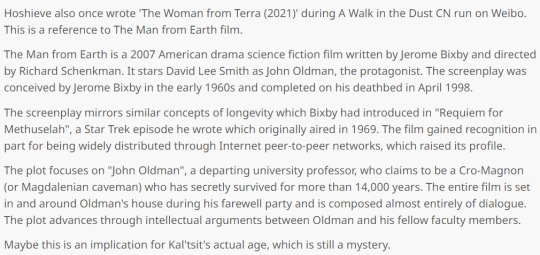

I always knew the ak gamepress “lore” articles were full of shit
but I didn’t realize they literally plagiarize wikipedia
#arknights#and for what purpose..#there's like 1 sentence of this that's maybe tangentially relevant#like okay this isn't a college essay you're not gonna get points docked or smth#but cmon. have a little self respect#i always thought they sorta had the vibe#of someone regurgitating wiki info to sound smart#but it's literally that... bro......#how can you make analysis#when you can't even tell star trek isn't relevant to kaltsit's character#...that sure is a sentence
19 notes
·
View notes
Text
me and mlynar
#arknights#mlynar nearl#toland cash#shitpost#i have a college essay to do but the arknight shitposting comes first
24 notes
·
View notes
Text
So, Deepcolor's oprec released, and upon reading a summary of it, I basically felt the entire world of Arknights click into place. Hear me out.
Deepcolor's Oprec details that Deepcolor was convinced by a messenger of the Cult of the Deep to become Seaborn. But she stopped her own assimilation when she realized that the Seaborn do not appreciate aesthetic beauty. She was disgusted, and literally left and stopped her own assimilation entirely due to her love of art, and has been holding it back with her painting.
And this made me realize. This is true of every character with seaborn blood who has resisted assimilation. Skadi sings. Specter sings. Laurentina sculpts. Gladiia dances. Mizuki cooks. Deepcolor is a painter. Amaia still translated books long after she had become Seaborn. Garcia played the piano. Lorenzo cared for the Stultifera.
Which also means...
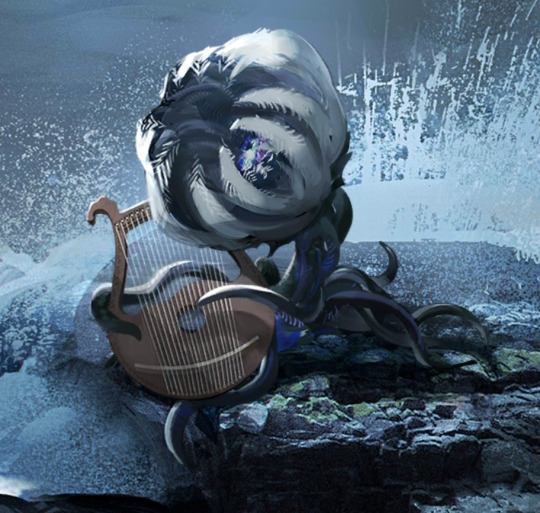
... Anita was never assimilated. Not fully.
But this makes sense, even outside of a "art holds back the darkness" power of friendship-tier story beat. Assimilation is the surrendering of the individual self to unity, the acceptance that you do not matter, that all that matters is giving your life and your existence to the perpetuation of a greater Whole. They cultivate only to consume. They sing, but their song is a profound silence.
And what is more individualistic, more self-revealing than art? There is no artistic expression without the self, without the understanding that you are a distinct voice, that your perspective matters, that there is only one you.
Perhaps you may have noticed, but this is the same as the Yan-Sui. They hold back the collective with their individual passions. Painting, movies, poetry, games, war.
There's one other thing with a connection to artistic expression - but this time, positively. Originium Arts. Artistic ability has long been associated with Originium Arts capability - Amiya plays the violin, Frostnova sings as she enters the battlefield, Goldenglow's hairdressing, Astesia's divination powering her arts, Lucian the Blood Diamond. I mean they're called Arts for the love of god, it's not exactly subtle.
But the Rhine Lab manga tells us that when an Oripathy carrier dies, the Originium left behind contains their DNA sequence, left behind after death. They may die, but there is something that is always left behind, something that always remains behind. There is always the thing that let them do their Arts. There is always their artistic ability.
There is always their art.
You do your art until you are taken by death, but what remains behind is the traces of it, the artistic DNA you have left behind, your Arts itself. You're gone, but the remnants are still there. And someone else will find it, taking your Arts into themselves to do their own Arts themselves. Sometimes it becomes part of you, living with you and growing inside you, granting you your abilities. Sometimes you simply hold it and use it as fuel and inspiration to make your own Arts.
And this is always what Arknights has been about. Not just metaphorically, but literally.
They hired individual artists, asking them to make characters according to their own sensibilities and style, then putting them into a cohesive world. They got talented musicians and gave them carte blanche to contribute to the musical identity of this game. They got talented voice actors and let them just go ham on the mic. The game's story concept debatably originated because of Lowlight creating Kal'tsit for a make your own OC art game.
It has always been about individuals, putting everything they have, everything that makes them unique, every part of their histories and sensibilities and quirks and personalities and identity and selfish desires and allowing them to shine as a collaborative effort, working together towards a greater goal that means something to people.
An organization of people, Infected by the artistic DNA of those they carry close. People using their Arts to push back the darkness, as best as they can. Even if they stumble and fall, even if they make mistakes, they will always try. To enjoy their life and practice their art.
Because the two greatest threats to the world of Terra, the Seaborn and Sui, are held back by.. simple artistic passion.
The passion and love of the community, the individual given space to shine and collaborate, singing to drown out the terror of the song without sound, the art without beauty, and the collective without the individual.
#arknights#long post#critical analysis#whoops guess who wrote an extended essay about arknights instead of doing her homework again
1K notes
·
View notes